Aftermath of Sierra Leone flooding
Editorial Advisory Panel Member Robert McAlister visits the National Stadium in Freetown, which is currently housing thousands of people who have been displaced by flooding, in this second blog from Sierra Leone.

I spent some valuable time today at the National Stadium in Freetown to assess the current status as part of building situational awareness to ensure our ongoing Disaster Management Training is realistic and based on the reality of the huge challenge facing the Office of National Security and its partners.
Thousands of displaced people from the Western District have presented themselves at the stadium requiring shelter and food, many mothers and small children among them. The mammoth task of providing the basics has been helped by the multiple stakeholders – including the stadium management teams – who are assisting.
Only the areas under the covered stands can be used as this allows shelter from the ongoing evening rain that continues daily. The pitch is completely waterlogged and exposed, so it is difficult to pitch adequate shelters there. Health care and monitoring is in place and enforced rigorously, owing to the volume of people and the ongoing potential for further spread of infection and associated diseases.
Everyone’s temperature is checked during entry and exit and again periodically while inside the stadium, to ensure early intervention. Mattresses have been provided, as have blankets, but this really is basic protection from the elements. Hot food is a massive boost for morale.
It’s easy to forget that many of the registered displaced people still need to maintain a normal life, leaving the stadium every day to travel to work and provide for their families and returning at night to eat and rest.
The long-term vision is still being established by the Land Ministry, which is investigating new housing areas outside the affected locations.
Driving around today, the effects of the floods are evident, with areas of road subsidence and people trying to return to normality and rebuild their lives.
The day also consisted of attending the National Strategic Committee Meeting, which discussed priorities and forward planning for the floods and later at the National Ebola Response Centre to hear the latest on the Ebola efforts and significant Ebola Events (as they are termed) in the country. While there are obviously cases that may show signs, very few are now leading to confirmed cases. It is incredibly pleasing to hear that school children are back at schools all over the districts and exams are in progress, this is a huge win after a long-run public campaign to do just that.
What has struck me most is just how professional and committed individuals working here are in conditions that are far from ideal. Training continues tomorrow involving further individual sessions with key strategic post holders looking at roles and responsibilities.
Robert McAlister, 29/09/2015